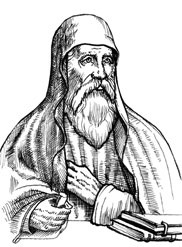Origen and Other Contributors
Next Part The Early Church Rejected Philosophy
Back to The Trinity
Back to By David C. Pack
During the second century, the trinity was subject to much speculation. For example, Justin Martyr, known for his anti-Semitism and opposition to all things Hebrew, defined the trinity as “the Father, Jesus Christ and the Holy Spirit” (Apology 61.3). His thinking was influenced by Middle Platonism, Gnosticism, and the writings of Philo and other prominent philosophers of that time, such as Numenius. Irenaeus defined the Godhead as consisting of “the Father, the Word and the Wisdom.” Eventually, the trinity concept became the focus of theologians and philosophers such as Clement of Alexandria and Origen.
Origen (A.D. 185-254) has been described as “the most distinguished and most influential of all the theologians of the ancient church, with the possible exception of Augustine. He is the father of the church’s science; he is the founder of a theology which was brought to perfection in the 4th and 5th centuries, and which still retained the stamp of his genius.”
Continuing, “He could not have been what he was unless two generations before him had labored at the problem of finding an intellectual expression and a philosophic basis for Christianity (Justin, Tatian, Athenagoras, Pantaenus, Clement). But their attempts, in comparison to his, are like a schoolboy’s essays beside the finished work of a master” (Encyclopedia Britannica 11th ed., vol. 20, p. 270).
Despite such praise, scholars recognized the difficulty of grasping Origen’s philosophical reasoning. Consider: “To us, indeed, his conception of the universe, like that of Philo, seems a strange medley, and one may be at a loss to conceive how he could bring together such heterogeneous elements; but there is no reason to doubt that the harmony of all the essential parts of his system was obvious enough to himself” (Ibid.).
What is this saying? Translated, this diplomatic expression is reduced to the following: “His theories do not make sense to us, but surely, they must make sense to him.”
Origen’s thoughts were considered so profound that “Orthodox theology has never, in any of the confessions, ventured beyond the circle which the mind of Origen first measured out” (Ibid.).
This was true concerning his version of the trinity, which has essentially remained intact as he had moulded and fashioned it—“Father, Son and Holy Spirit.” Of all who contributed to the concept of the trinity, from definition to extensive commentary, Origen is considered to have far exceeded all the others.
Like Philo, he grew up and spent most of his life in Alexandria, Egypt, under the influence of its “progressive” atmosphere, as well as contributing to it. Here is some background on the Alexandria that influenced Origen: “Alexandria had been, since the days of the Ptolemies, a centre for interchange of ideas between East and West—between Egypt, Syria, Greece and Italy; and, as it had furnished Judaism with an Hellenic philosophy, so it also brought about the alliance of Christianity with Greek philosophy…in Alexandria, Christian ideas were handled in a free and speculative fashion and worked out with the help of Greek philosophy” (Ibid.).
Concerning his writings, it should be pointed out that “Origen is probably the most prolific author of the ancient church. ‘Which of us,’ asks Jerome, ‘can read all that he has written?’ The number of his works was estimated at 6000…” (Ibid., p. 271).
Origen was steeped in asceticism, the doctrine of extreme self-denial and austerity, and the worship of the human will. He slept on cold stone floors and went barefoot most of his life. To curb any future sexual lust and to demonstrate his stoic courage, he actually surgically made himself a eunuch while lecturing to his pupils. Notice this description: “His manner of life was ascetic; the sayings of the Sermon on the Mount and the practical maxims of the Stoics were his guiding stars” (Ibid., p. 270).
Heavily influenced by the wisdom of Plato, Philo and Origen, Christianity became increasingly receptive to Greek philosophy. Following in the tradition of the Gnostics, theologians and philosophers continued to allegorist the scriptures in order to illustrate a higher order of wisdom. In the truest sense, philosophic reasoning became the centre of the intellectual universe, with the Word of God orbiting to its beckoning.
Traditional “Christianity,” propelled by Greek philosophy, freed itself from submitting to God’s authority and set about to refashion the God of the Bible into the highest form that the “greatest” human minds could envision and devise. This was most realized in the doctrine of the trinity—a mystery even to its creators, but considered the pinnacle of human creativity.


